The fitness industry is oversaturated and undereducated, but Pilates is bucking that trend and creating opportunities for new instructors every day. A recent survey from Balanced Body found that 77% of Pilates studios are experiencing growth and that 40% of studio owners are looking for new instructors. Talk about opportunity!
If you’ve ever thought about getting certified in Pilates, now is the time to do it. If you’re looking to niche down your career or make a more profitable pivot, this might be your opportunity. Are you hyped yet? I hope so, because we’re about to dive into the best online Pilates certifications to help you get certified and join a growing industry.
Topic Contents
How We Chose the Best Online Pilates Certifications

If you search the internet, every organization will tell you why they’re the best choice, but we like to keep things real and transparent. We’ll be assessing each program based on the following criteria:
- Organization and program credibility – Is the certification offered by a well-known and respected organization, or was it thrown together by someone on the internet looking to make money?
- Curriculum – Is the curriculum in-depth or surface-level? How does it stack up to in-person training options? Do you need a background in fitness, or can you come in with no prior experience?
- Format – Is the course easy to follow and use? Does it accommodate different learning styles?
- Support and Community – Does the course offer live sessions, Q&A sessions, or individualized feedback? Are there opportunities to engage online with instructors and other students?
- Cost – Is the expense reasonable for the average person? Are there payment plans or work-study options available?
If any of these matter to you, read on to see how the best Pilates programs stack up.
The Best Online Pilates Certifications
Here’s the short list for the best online training for Pilates. Keep reading for an in-depth look at why each certification made our list. It’s important to note that each of these certifications is for Mat Pilates. Reformer Pilates and other styles are typically only offered in person due to the need for direct supervision and more extensive equipment.
- Power Pilates Complete Mat Academy – Best Classical program and crowd favorite.
- ISSA Mat Pilates Instructor Course – Best for fitness professionals and niche-seekers.
- BASI Mat Flex Program – Best for Pilates career and education seekers.
- AFPA Pilates Fitness Instructor Certification – Best for gym and group fitness instructors.
- Balanced Body Mat Instructor Training – Best for individualized training options.
A Detailed Look
1. Power Pilates Complete Mat Academy
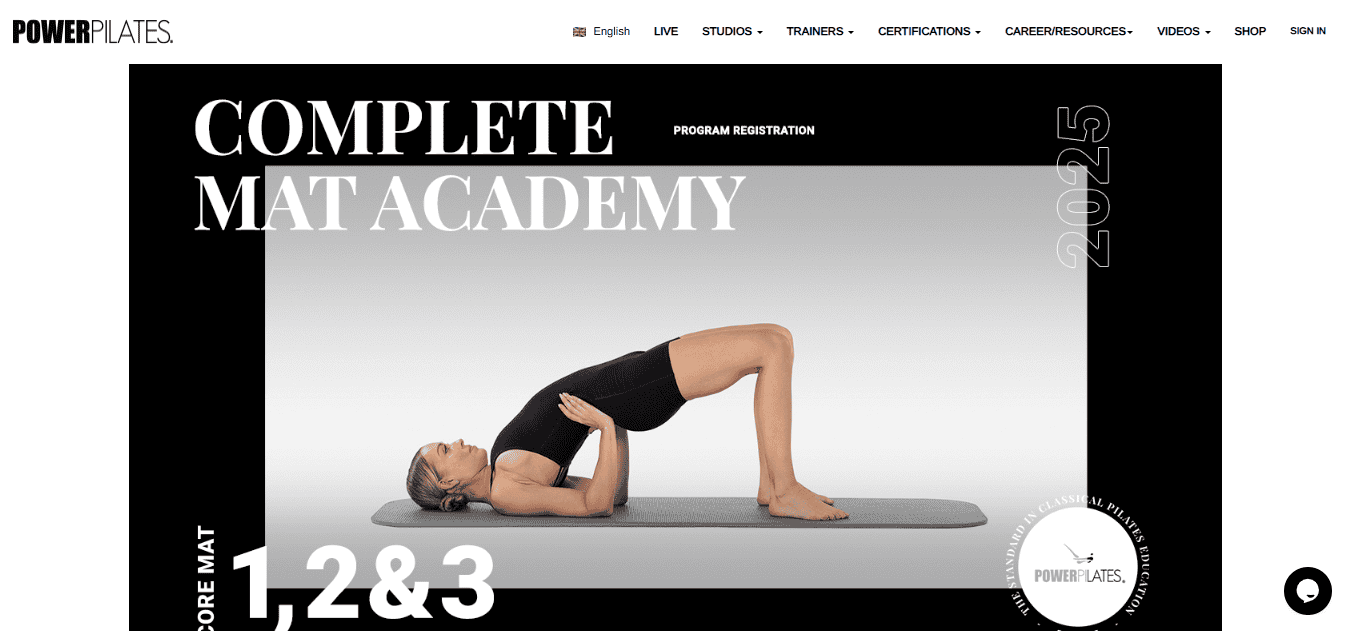
Power Pilates was created by a community of Pilates instructors focused on Classical practices. This certification is a crowd favorite (according to the people of Reddit) and one of the most independent-learning options if you’re looking for a complete mat certification. Power Pilates offers a bundle of their Beginner (Mat I), Intermediate (Mat II), and Advanced (Mat III) mat courses that build on each other to help you go beyond the basics of mat Pilates.
Their first two courses can also be applied as continuing education credits for ACE, which is great for those who have another certification, like personal training or group fitness, and need CECs.
You can start with just their Core Mat I class or sign up for all three at once, whichever you prefer. Their Complete Mat Bundle is $1700, which includes e-copies of class materials. If you prefer hard copies, they are offered for an additional $250.
The format consists of manuals, videos, animated lessons, quizzes, workouts, and optional live practice sessions.
Their final examination can be done in person at a partner studio or via live video conference with one of their teacher trainers.
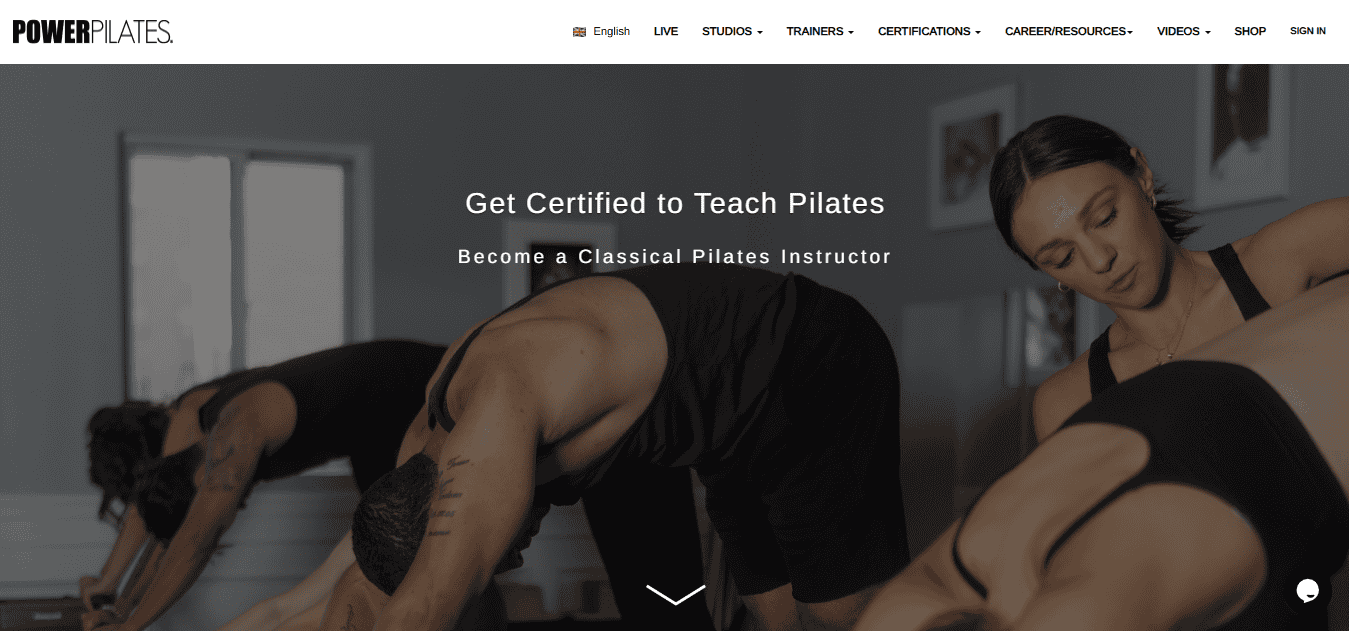
Pros: Follows a more studio-style experience; provides advanced training.
Cons: Expensive for an online program; no discussion of one-on-one office hours.
Ideal for: Individuals wanting a complete mat course with the flexibility of an online program that can be used in studios and gym settings.
2. ISSA Mat Pilates Instructor Course
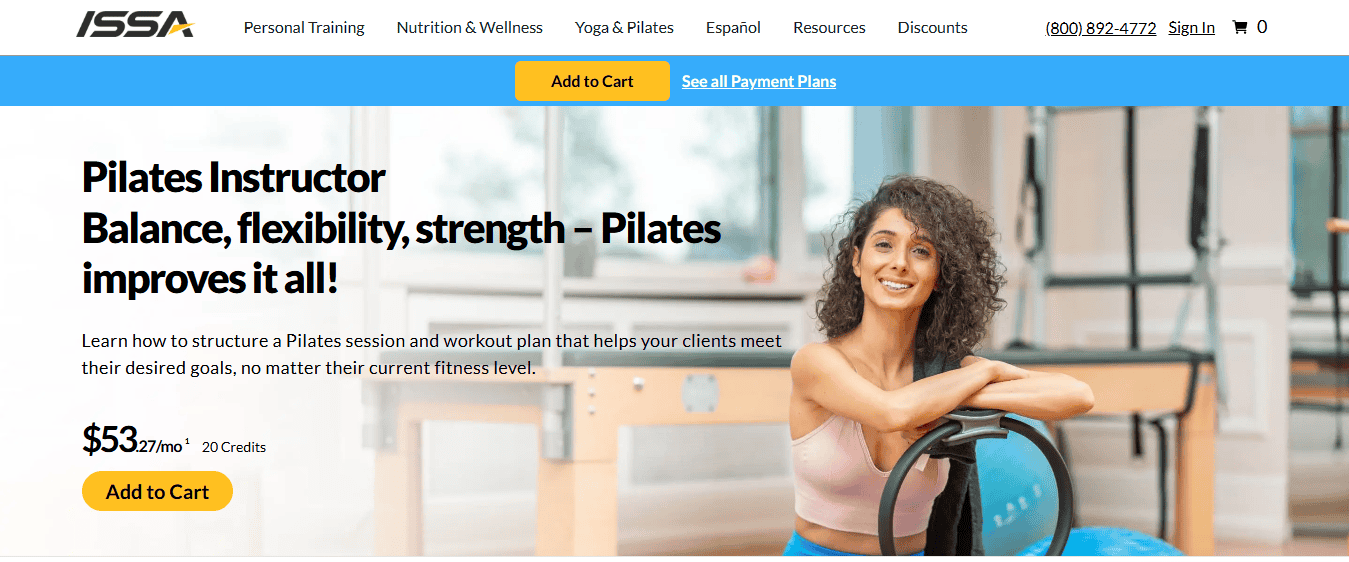
ISSA, or the International Sports Science Association, has been providing fitness education since 1988. Their certification is the place to start if you want to get your toes wet before jumping into a big investment or career change. Many in-person and some online programs can get pricey and intensive very quickly, which can deter many people who haven’t fully committed to the idea. ISSA’s certification solves a lot of that.
It offers a single course that provides an approach that introduces students to anatomy and physiology concepts, basic principles, and how to develop safe and effective programming.
Their pricing is some of the most straightforward. To pay for the certification in a single payment, the cost is $639.20 (using their current promotion). You can also split it into payments of $106.53 for 6 months or $53.27 for 12 months. The payment plan option makes it a great choice for those who can’t or don’t want to drop a lot of money into a certification at once.
The course is entirely online, taken at your own pace. It includes video and audio lessons, exercises, and quizzes. An e-copy of the textbook is also provided along with ready-to-use client forms.
Their certification exam is an open-book, open-note test that you can take at home.
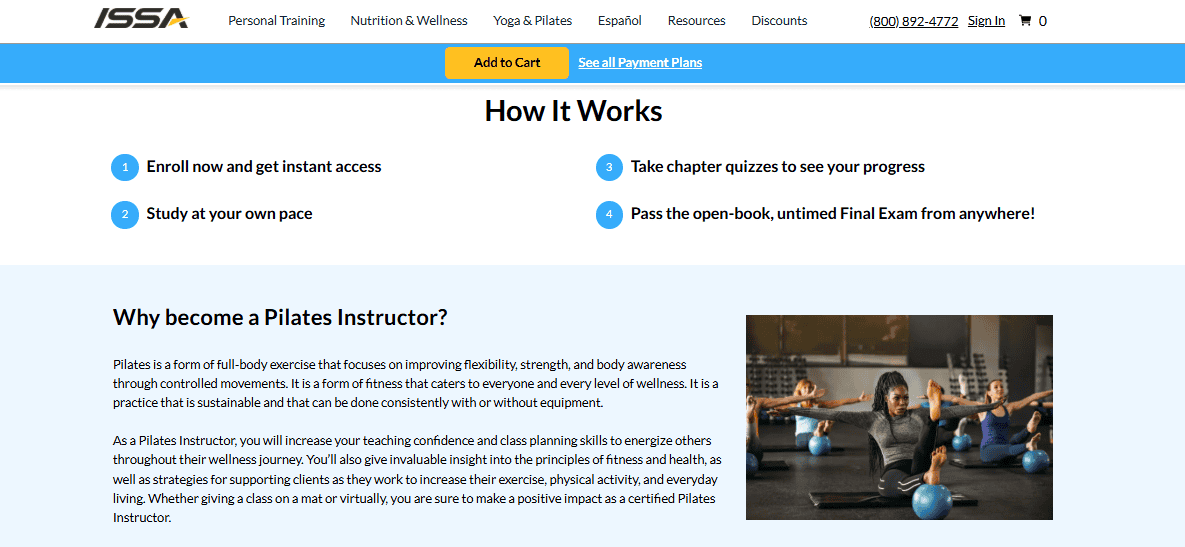
Pros: Easy to fit into schedule if working part/full time; option to study at your own pace.
Cons: Not as comprehensive as other options; no live elements or teaching opportunities.
Ideal for: Fitness professionals or others looking to expand their certifications, or those wanting to teach Pilates at a gym or other multi-purpose facility.
3. BASI Mat Flex Program
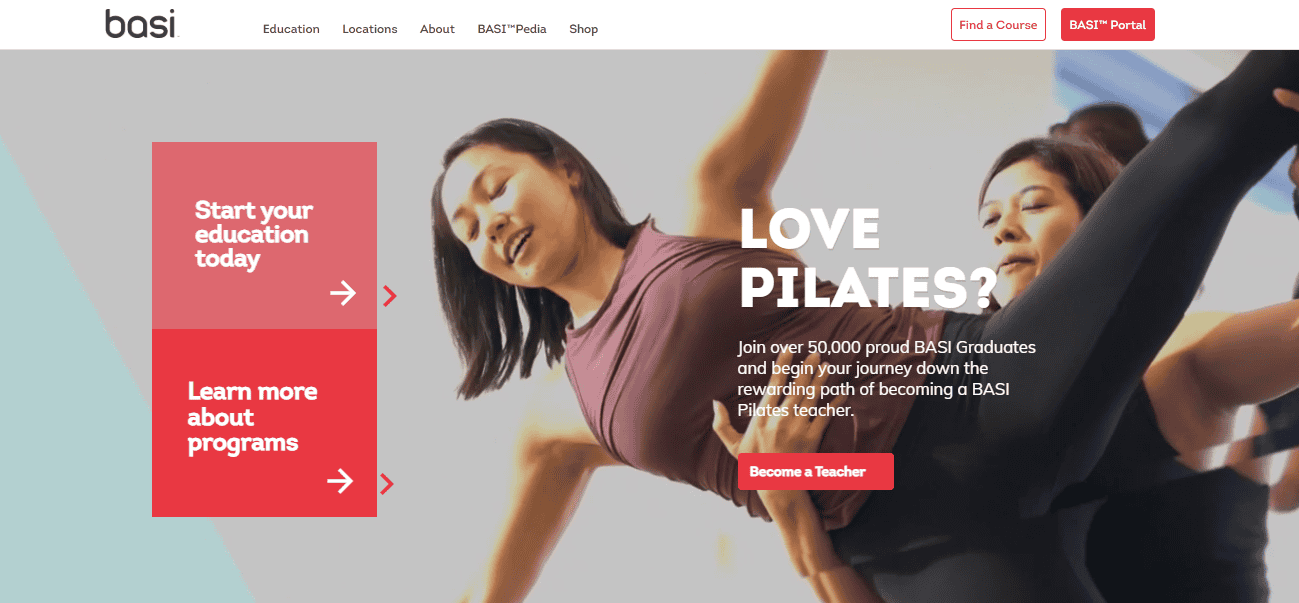
BASI stands for Body Arts and Science International, and has been providing Pilates education for over 30 years. This certification is BASI’s introduction to Pilates and prepares students for more comprehensive study through their other programs. This course covers topics including anatomy, posture, cueing, and exercise adaptation. It also requires 85 student hours, broken down into 40 hours of self-practice, 15 observation hours, and 30 hours of practice teaching.
This course is unique in comparison to the other two listed as it incorporates both independent elements and set online class times. It takes place over the course of 4 days, where you’ll spend half of each day in live online work.
The program cost is $500, half of which can be applied toward a Comprehensive in-person course if you choose to advance. It includes e-versions of their study guide, workbook, and written examination. There are additional fees associated with the certification, including the BASI Interactive Monthly Subscription ($10/month), studio fees for your 85 student hours (as required by the studio), and testing fees for the certification ($150).
To receive your certificate, you have to complete the program, 85 student hours, a final written exam, a final teaching assessment, and a practical examination.
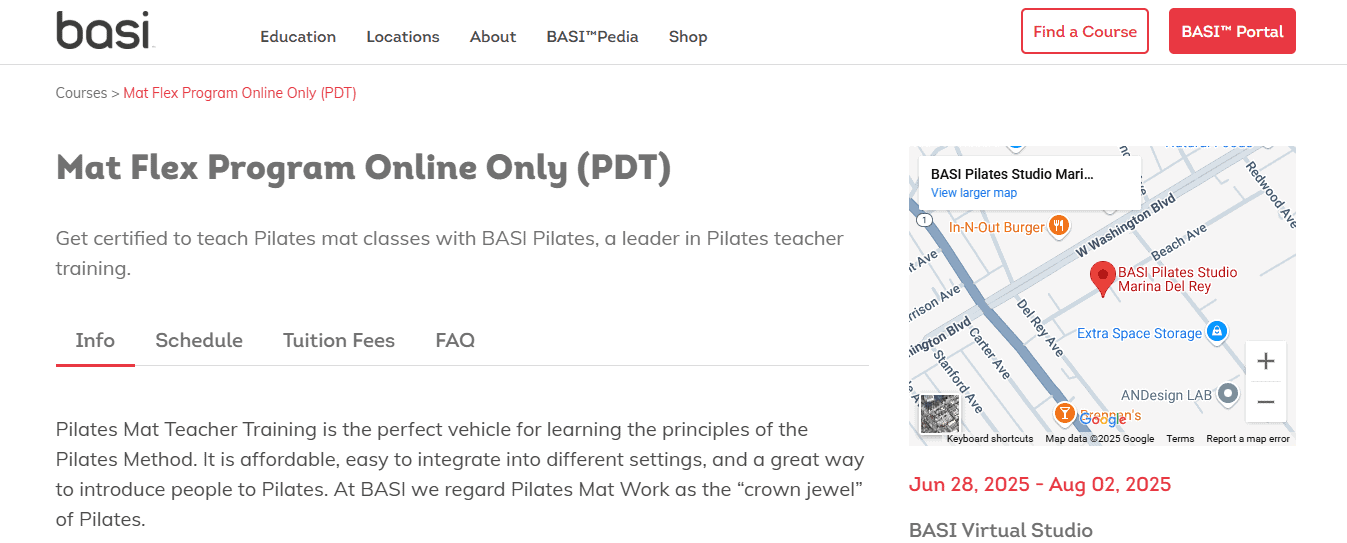
Pros: Required online time if you need commitment and enjoy the live element; option to apply part of your tuition to your next course.
Cons: Specific time commitment; a lot of requirements to pass the course. They also state that they can cancel or postpone your scheduled class time if they don’t have enough students, which could potentially be inconvenient.
Ideal for: Individuals who need to be committed to a certain time and want to complete their certification quickly.
4. AFPA Pilates Fitness Instructor Certification
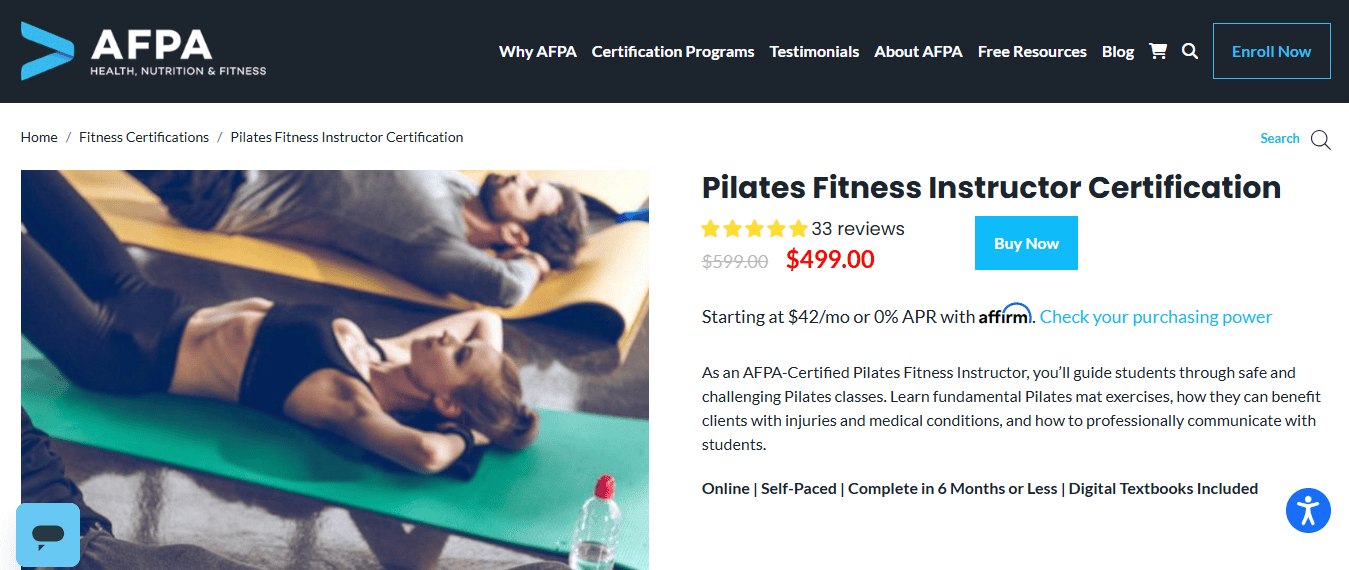
The certification itself tells you a bit about this certification. It is more fitness/gym-focused than other studio-style options, as AFPA provides a range of certifications for health and fitness professionals, and has done so for over 29 years.. AFPA’s certification focuses on fundamental mat exercises. Students will study the philosophy and principles of Pilates, as well as anatomy and class structure.
The certification is another single-course offering, much like ISSA’s. It does not have required observation hours or other outside elements, making it more accessible for those without a Pilates studio nearby. It’s an entirely online self-study course that takes 8 weeks to complete if you study 7-10 hours a week, or up to 6 months if you don’t have as much time to commit, according to their website.
The course is currently on sale for $499, but is regularly priced at $599. AFPA offers in-house payment plans and monthly payments with Affirm, giving you options to fit your budget.
To complete the course, there is a 100-question open-book exam. The exam saves your progress, so you don’t have to take the entire test at once, allowing you to come back to it if you don’t have time to sit for the complete test.
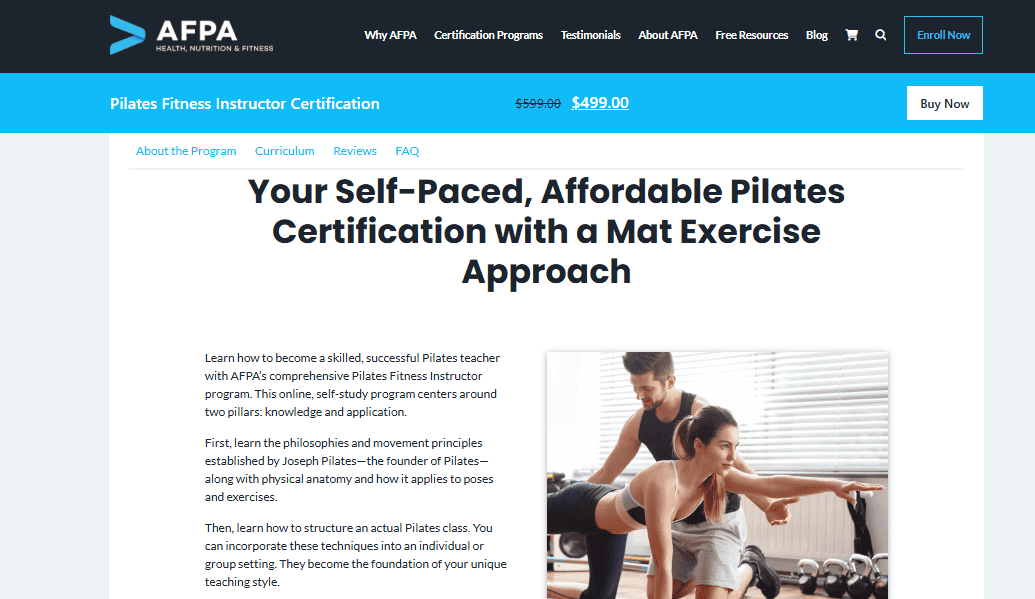
Pros: Inexpensive course and low-stress final examination.
Cons: May be too basic for some and potentially not appropriate for more advanced teaching.
Ideal for: Group fitness instructors or personal trainers who want to add to their skillset without breaking the bank.
5. Balanced Body Mat Instructor Training
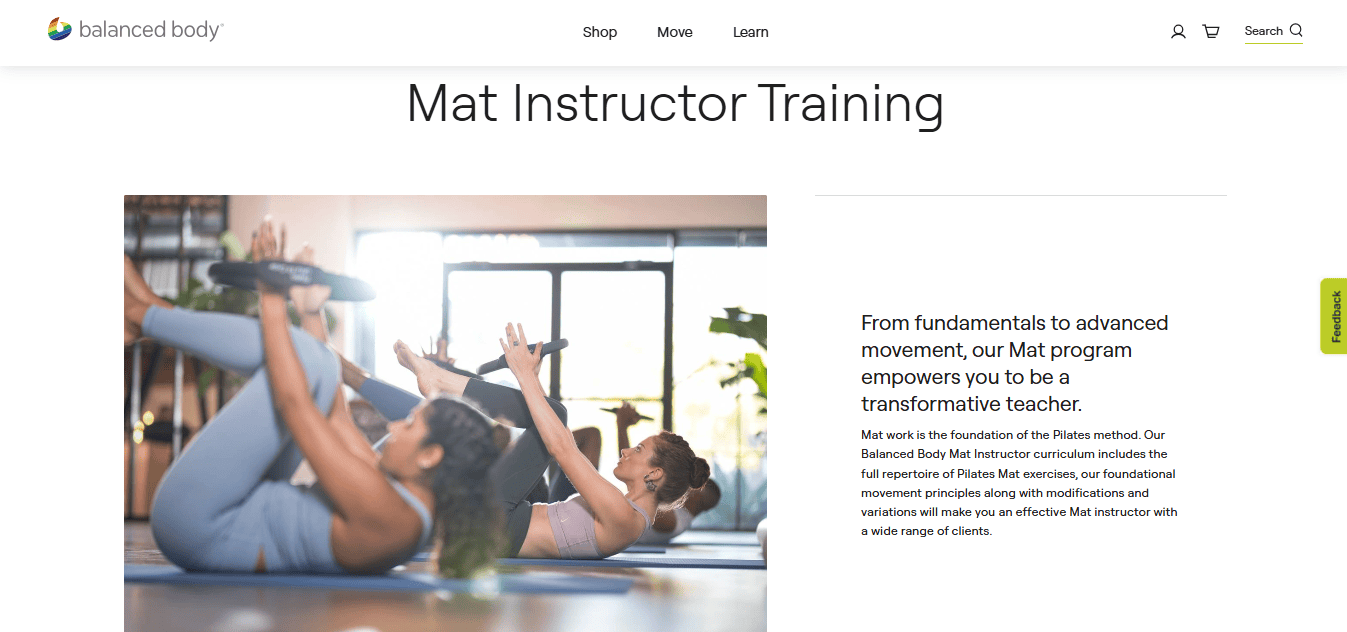
Balanced Body has been in business for over 45 years, primarily providing Pilates equipment and education. They offer one of the more complete trainings among online offerings, detailing their approach to both classic and contemporary Pilates, which the aforementioned courses do not.
Their mat course comprises three separate courses: Mat 1 (an introduction and beginner/intermediate exercises), Mat 2 (intermediate and advanced exercises), and Mat 3 (props and enhancements). All three are required to be certified with Balanced Body.
The way the courses are administered will either make or break it for you. Rather than having a single streamlined approach, Balanced Body offers each class from many approved instructors. Their website lists multiple training options from studios and instructors all over the world. The courses are 16 hours over a two-day period.
The cost varies quite a bit, depending on the studio/instructor you choose, but primarily ranges between $450-$600 per course. There is an additional $50 manual fee and $10 streaming fee for each course as well, bringing the 3-course investment to approximately $1700.
To become fully certified as a Balanced Body Mat Instructor, there is a bit of a laundry list of qualifications. They recommend their course Anatomy in Three Dimensions, and then require the Balanced Body Movement Principles course along with the three Mat courses described above. 20 personal sessions, 15 observation hours, and 35 teaching hours are also required, alongside a final written and practical test.
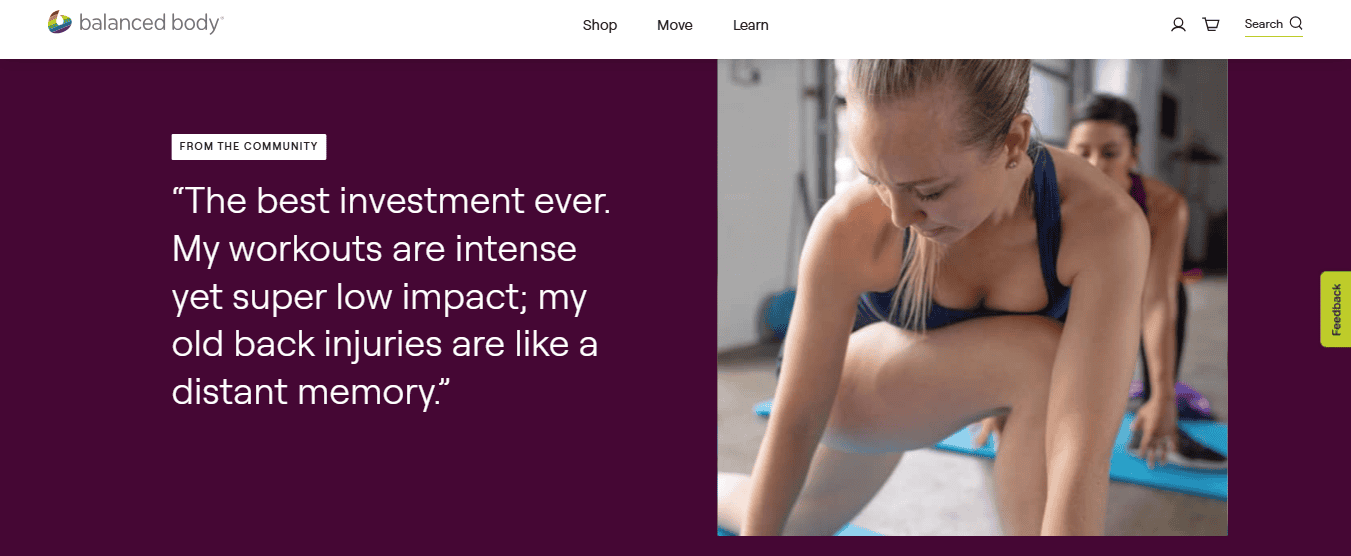
Pros: Extensive course study; options to have and choose multiple teacher trainers.
Cons: Course selection is somewhat confusing and overwhelming; a lot of overall requirements to complete.
Ideal for: People who love to pick every detail of their certification and value mentorship by specific teacher trainers or studios.
Final Thoughts
Online education, especially in the fitness industry, sometimes gets a bad rap. It is true that no amount of fantastic visuals or world-class textbooks can replace hands-on learning and adjustments, but online learning offers many benefits that in-person coursework does not. For many of us who work, go to school, raise families, or have other obligations, traditional learning does not work. It can often mean the difference between education and no education. Pilates training is no exception. These courses represent the best in online Pilates training, making it possible for individuals worldwide to learn, advance their careers, and positively impact the lives of others.
Sara Jackson is a wellness writer, certified fitness professional, and passionate advocate for realistic, sustainable health. She holds a Bachelor’s degree in Exercise & Sports Science and is certified as an ACSM Personal Trainer, AFAA Group Fitness Instructor, 200-Hour Registered Yoga Teacher, and Certified Life Coach. With additional training in Parks & Tourism, Sara brings a well-rounded understanding of how movement, mindset, and lifestyle all connect.
Sara brings her years of experience—and her passion for helping people feel better in their bodies—here to Alt Protein. Whether she’s writing about fitness, nutrition, or mind-body wellness, her goal is always the same: to make healthy living feel approachable, empowering, and grounded in real life.







